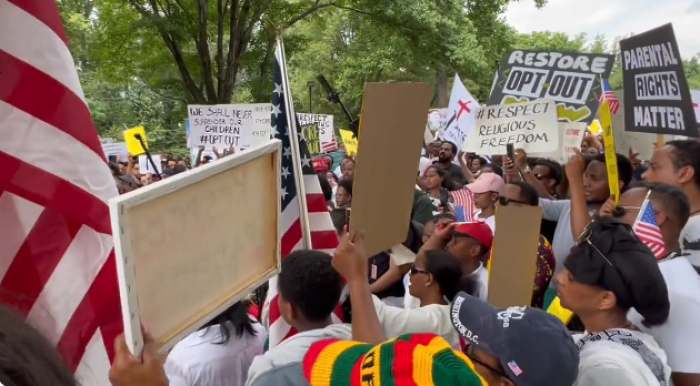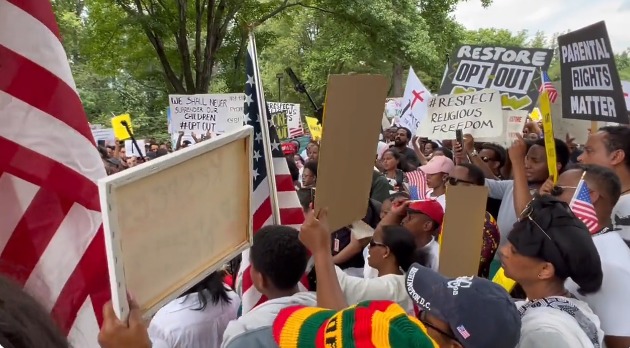
The U.S. Supreme Court has ruled that parents can opt their children out of a Maryland school district’s LGBT-themed curriculum materials over religious objections, reversing an appeals court ruling.
In a 6-3 decision released Friday, the high court ruled in Mahmoud, Tamer, et al. v. Taylor, Thomas W., et al. that Montgomery County Public Schools in Maryland cannot force children to be exposed to LGBT-themed books in the curriculum. After a massive demonstration in 2023, a religiously diverse group of parents challenged the school district’s refusal to grant opt-outs for lessons that include LGBT literature.
Justice Samuel Alito authored the opinion of the court, being joined by Chief Justice John Roberts and justices Amy Coney Barrett, Brett Kavanaugh, Neil Gorsuch and Clarence Thomas.
“A government burdens the religious exercise of parents when it requires them to submit their children to instruction that poses ‘a very real threat of undermining’ the religious beliefs and practices that the parents wish to instill,” wrote Alito.
“And a government cannot condition the benefit of free public education on parents’ acceptance of such instruction. Based on these principles, we conclude that the parents are likely to succeed in their challenge to the Board’s policies.”
The high court granted the parents a preliminary injunction against the MCPS’ inclusion of LGBT-themed books in the curriculum on religious grounds.
“The practice of educating one’s children in one’s religious beliefs, like all religious acts and practices, receives a generous measure of protection from our Constitution,” Alito continued.
“And this is not merely a right to teach religion in the confines of one’s own home. Rather, it extends to the choices that parents wish to make for their children outside the home.”
Justice Sonia Sotomayor authored a dissenting opinion, joined by justices Ketanji Brown Jackson and Elena Kagan, arguing that the majority opinion “invents a constitutional right to avoid exposure to ‘subtle’ themes’ contrary to the religious principles’ that parents wish to instill in their children.”
“Given the great diversity of religious beliefs in this country, countless interactions that occur every day in public schools might expose children to messages that conflict with a parent’s religious beliefs,” wrote Sotomayor.
“Requiring schools to provide advance notice and the chance to opt out of every lesson plan or story time that might implicate a parent’s religious beliefs will impose impossible administrative burdens on schools. The harm will not be borne by educators alone: Children will suffer too.”
In October 2022, the Montgomery County Board of Education approved a group of LGBT-themed books for inclusion in schools’ English language arts curricula. After a large parents’ protest outside the school district office in Rockville in 2023 that included many Christian and Muslim parents from various backgrounds, the parents sued the board, arguing that officials violated their sincerely held beliefs.
U.S. District Judge Deborah Boardman, a Biden appointee, rejected the motion for a preliminary injunction in August 2023, concluding that the parents failed to show that the “use of the storybooks crosses the line from permissible influence to potentially impermissible indoctrination.”
A three-judge panel of the 4th U.S. Circuit Court of Appeals upheld the lower court ruling in a 2-1 decision in May of last year, with Circuit Judge G. Steven Agee, a George W. Bush appointee, authoring the majority opinion.
“[T]here’s no evidence at present that the Board’s decision not to permit opt-outs compels the Parents or their children to change their religious beliefs or conduct, either at school or elsewhere,” wrote Agee.
Circuit Judge A. Marvin Quattlebaum, Jr., a Trump appointee, dissented, writing that the parents had “shown the board’s decision to deny religious opt-outs burdened these parents’ right to exercise their religion and direct the religious upbringing of their children by putting them to the choice of either compromising their religious beliefs or foregoing a public education for their children.”
“The board’s refusal to grant the parents’ requests for religious opt-outs to instruction with the books the board required be used to promote diversity and inclusivity to the LGBTQ+ community forces the parents to make a choice — either adhere to their faith or receive a free public education for their children. They cannot do both,” Quattlebaum said.
In January, the Supreme Court issued a miscellaneous orders list agreeing without comment to an appeal in the case.

















